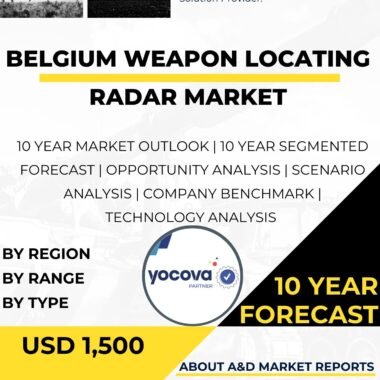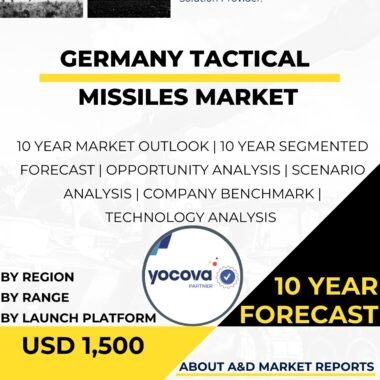Description
The Netherlands Close-in Weapons Systems (CIWS) market has witnessed significant growth and development over the years, driven by factors such as increasing security concerns, technological advancements, and the nation’s commitment to bolster its defense capabilities. CIWS, also known as “point defense” systems, are essential components of a country’s naval and land-based defense, designed to intercept and neutralize incoming threats, such as missiles, rockets, and other projectiles, at short ranges. As an integral part of the broader defense industry, the Netherlands has been actively involved in the procurement, development, and integration of CIWS into its military infrastructure.
In recent years, the escalating security threats and geopolitical tensions across the globe have underscored the importance of robust and effective CIWS systems. The Netherlands, being a key player in the European defense community, has recognized the significance of investing in modern and cutting-edge technologies to safeguard its national interests and support its allies in joint defense operations. The country’s strategic location with major shipping lanes passing through its territorial waters adds further impetus to the need for a formidable CIWS defense network.
The Dutch CIWS market has witnessed a notable surge in investments from both the government and private sector entities. The defense budget allocated by the Dutch government has seen a steady increase, allowing for substantial funding to bolster the nation’s defense capabilities, including investments in advanced CIWS technologies. Furthermore, collaborations between domestic and international defense companies have been instrumental in accelerating research and development efforts, enabling the Netherlands to access the latest innovations in CIWS systems.
The Netherlands has placed a strong emphasis on homegrown solutions, encouraging the development of indigenous CIWS technologies. This commitment to domestic innovation has resulted in partnerships between the government, research institutions, and local defense contractors. These collaborations have not only led to the creation of state-of-the-art CIWS platforms but have also facilitated technology transfers and export opportunities for the Dutch defense industry.
The evolving threat landscape has pushed the Netherlands to focus on CIWS systems that offer enhanced versatility, accuracy, and multi-mission capabilities. Advanced sensor technologies, including radar, electro-optical sensors, and infrared tracking systems, have become integral components of modern CIWS platforms, ensuring rapid threat detection and response. Moreover, the integration of Artificial Intelligence (AI) and Machine Learning (ML) algorithms has significantly improved the systems’ autonomous operation and decision-making capabilities.
The Dutch Navy, in particular, has been a key driver of CIWS adoption, recognizing the critical need for maritime defense systems. State-of-the-art CIWS systems deployed on naval vessels act as a robust last line of defense, safeguarding warships and maritime assets from a variety of threats. Furthermore, the Netherlands’ participation in international peacekeeping missions and NATO operations has further highlighted the importance of reliable CIWS platforms in ensuring collective security and stability.
As the global defense community continues to witness advancements in missile and drone technologies, the Netherlands recognizes the necessity of staying at the forefront of CIWS innovation. The development of laser-based CIWS systems, as well as the integration of directed-energy weapons, is actively being explored to counter emerging threats effectively. These cutting-edge technologies have the potential to revolutionize the CIWS landscape, providing the Netherlands with a significant advantage in defending its territorial waters and contributing to regional and global security.
The Netherlands’ commitment to adhering to international arms control agreements and export regulations plays a vital role in shaping its CIWS market. The country’s reputation for responsible arms trade practices has earned it trust and collaboration opportunities with other nations. This has not only bolstered its own CIWS capabilities but has also opened doors for potential partnerships, joint ventures, and export opportunities, contributing to the nation’s economic growth.
In conclusion, the Netherlands’ CIWS market is on a trajectory of growth and advancement, driven by its commitment to ensuring national security and its dedication to fostering domestic innovation. As the threat landscape continues to evolve, the Dutch defense industry’s focus on cutting-edge technologies, multi-mission capabilities, and collaboration with international partners remains critical in ensuring the country’s preparedness to tackle emerging challenges. The Netherlands’ role in the CIWS market is not only significant for its own defense needs but also for contributing to regional and global security efforts.




